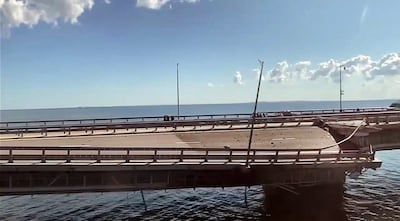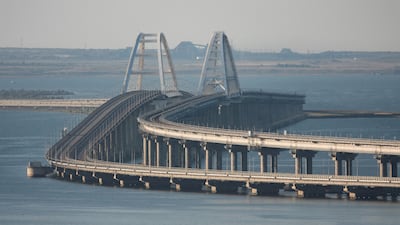Two people died on Monday in an explosion on a bridge connecting Crimea to Russia’s mainland that is vital to sustaining the Kremlin’s military operations in southern Ukraine.
The bridge connecting Russian-annexed Crimea and Russia carries heavy significance for Moscow logistically and psychologically, as a key artery for military and civilian supplies bound for Crimea and as an assertion of its control of the peninsula.
The explosion left a section of the road hanging perilously. The damage initially appeared to be less severe than that caused by a blast in October, but highlighted the bridge’s vulnerability.
Russia's Anti-Terrorist Committee claimed Ukraine attacked the bridge using unmanned drones on the water's surface.
Russia's Investigative Committee blamed Ukrainian “special services” for the attack and said it had opened a criminal investigation.
The Ukrainian military initially suggested the attack could be some kind of provocation by Russia itself, but Ukrainian media later cited unidentified sources as saying its security service was behind it.
Three Ukrainian media outlets quoted unnamed sources as saying Ukraine's domestic security agency and navy were behind the incident, and that they had used seaborne drones to attack it.
Ukrainian public broadcaster Suspilne, online publication Ukrainska Pravda and The New Voice of Ukraine media outlet cited one or more sources saying the navy and the SBU were behind the incident.
All three media outlets quoted at least one source as saying seaborne drones had been used against the bridge.
Ukrainian Security Service spokesman Artem Degtyarenko said in a statement that his agency would reveal details of how the “bang” was organised after Kyiv has won the war.
The Health Ministry in Russia's Krasnodar region, which lies at the eastern end of Kerch bridge, said a married couple were killed while their daughter was injured.
Russia declared an emergency following the blast. The Grey Zone Telegram channel, which is affiliated with the Wagner mercenary group, reported two strikes on the bridge shortly after 3am.
Traffic on the bridge came to a halt, while rail traffic across the 19-kilometre span was paused for about six hours.
Video shared by local media on Monday appeared to show a section of road on the bridge sloping to one side after splitting.
The bridge, which spans the Kerch Strait, was damaged in October by a lorry bomb and required months of repairs before resuming full service.
It carries both road and rail traffic and is an important supply artery for Russia’s war in Ukraine.
Russian media identified the dead as Alexei and Natalia Kulik, who were travelling to Crimea for a summer holiday. The 40-year-old Mr Kulik was a lorry driver and his 36-year-old wife was a municipal education worker. Their 14-year-old daughter suffered chest and brain injuries.
The chairman of Crimea’s parliament, Vladimir Kostantinov, blamed the blast on Ukraine’s “terrorist regime”.

Andriy Yusov, a spokesman for Ukraine’s military intelligence department, said: “The peninsula is used by the Russians as a large logistical hub for moving forces and assets deep into the territory of Ukraine.
“Of course, any logistical problems are additional complications for the occupiers.”
Presidential adviser Mykhailo Podolyak welcomed news of the incident, without saying how it happened.
“Any illegal structures used to deliver Russian instruments of mass murder are necessarily short-lived … regardless of the reasons for the destruction,” he wrote on Twitter.
George Barros, an analyst at the Washington-based Institute for the Study of War, said serious damage to the bridge would significantly affect Russian supply lines.
“Russia will only have one ground supply line – the coastal highway on the Sea of Azov – to sustain [or evacuate] its tens of thousands of troops in occupied Kherson and Crimea if [Ukraine] manages to degrade/destroy the bridge,” Mr Barros said on Twitter.
The Kerch Bridge is a conspicuous symbol of Moscow’s claims on Crimea and an essential land link to the peninsula, which Russia illegally annexed in 2014.
The $3.6 billion bridge is the longest in Europe and is crucial for Russia’s military operations in southern Ukraine in the nearly 17-month-old war.
The bridge was built despite strong objections from Ukraine and is the most visible and constant reminder of Russia’s claim that Crimea is legitimately Russian.
President Vladimir Putin drove across the bridge at its formal opening. Mr Putin is also closely connected to construction tycoon Arkady Rotenberg, whose company won the $3.5 billion contract to build the bridge.
The Ukrainian counteroffensive, which began last month, has so far been slow, with troops capturing a string of small hamlets in the south and some territory around Bakhmut, the small eastern city Russia captured in May after the war's deadliest combat.
Kyiv said on Monday its forces had captured another 18 square kilometres of territory over the past week, bringing the total captured to more than 210 square km.
End of grain deal
On Monday, Russia said it would end a deal brokered by the UN and Turkey that allowed the safe Black Sea export of Ukrainian grain.
The last ship to travel under the agreement left the port of Odesa on Sunday morning, according to a Reuters witness and MarineTraffic.com.
Kremlin spokesman Dmitry Peskov said Russia would return to the pact when its demands on exporting its own produce are met.
“The Black Sea agreements ceased to be valid today,” Mr Peskov said.
“Unfortunately, the part of these Black Sea agreements concerning Russia has not been implemented so far, so its effect is terminated.”
The deal had been credited with easing the global food crisis unleashed by the war between Russia and Ukraine, two of the world's top agricultural producers.
It gave safe passage to ships sailing through the Black Sea on condition that Russia and Ukraine could both inspect their cargo.
The Kremlin said there was no link between the attack and its decision to suspend the grain deal.


